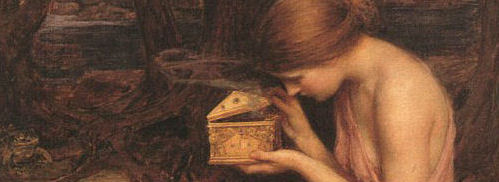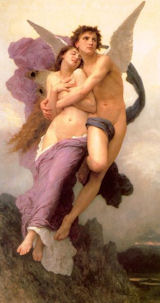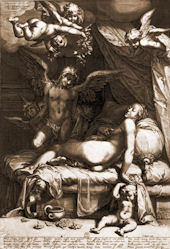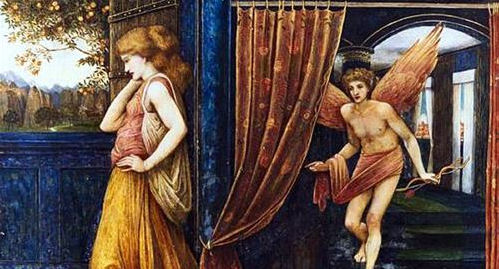




Why did I define Myth by pointing out the ways in which it differs from Fairy Tale in my Introduction 2B, Myth, With Fairy Tales The Source of all Storytelling? And why did I not foresee the difficulty of bringing some semblance of coherence to an analysis of Myth and Pride and Prejudice similar to that given for Fairy Tale and Pride and Prejudice?
To follow a similar format, I would furnish three related but different and separate perspectives:—
Except that there is almost no overt similarity between Amor and Psyche the Myth, and the Novel Pride and Prejudice — if we ignore the subversive content of the Spencer-Stanhope painting above [see Pictures-2] with its eloquent portrayal of the insouciant Amor/Cupid arriving at Psyche's house intending to carry out his mother's injunction to wound Psyche with one of his arrows so that she will fall in love with the ugliest creature imaginable, and thus be rendered ridiculous in the eyes of men — and upon beholding Psyche accidentally wounding himself and becoming his own unintended victim.
Most paintings dealing with Myth have a dreamlike blurring of outline, completely at odds with the film-like immediacy of the John Roddam Spencer-Stanhope work, which seems to me to bring to vibrant life the Myth in an identical manner to that given the Novel Pride and Prejudice by the 1995 filmed miniseries. — Film which echoes the Picture nicely by the irony of Mr. Darcy 'saving' his friend Bingley from contamination by association with the deplorable family connections of the divinely good and beautiful Jane Bennet only to become himself enthralled by the lovely dark eyes of the less good and beautiful but oh, so lovable younger sister Elizabeth Bennet.
Of course we realize that writers of both Myth and Novel have used the far older Fairy Tale as a model, the Roman Lucius Apuleius for shameless satire; the English Jane Austen as a love story to emulate.
With the result that much of the comparisons in these first two sections will be between Myth and Fairy Tale, with the final discussion expanded to a three-way comparison of the relevant Myth, the chosen Fairy Tale, and the Novel.
* * * * *
Unlike most fairy tales and myths, whose origins are shrouded in the mists of antiquity, Amor and Psyche has a clearly defined provenance as part of a compendium entitled Metamorphoses (otherwise known as The Golden Ass), written in Latin by Lucius Apuleius, born 124 A.D. in the Roman colony of Numidia, now Algeria.
In most cases, I've taken for purposes of reference that book or website which summons up the Fairy Tale or Myth encountered in my childhood, even over other sources which purport to be more authentic. In the case of Amor and Psyche, however, I chose the lavish detail contained in a version found on the website http://www.euphoniusmonks.com/amor.htm — and only later discovered the humour and irony peeking slyly round the corner of every paragraph.
At first glance, the differences in plot between Fairy Tale and Myth seem so trivial as hardly to be worth mentioning.
It shouldn't make an enormous difference that unlike our chosen Fairy Tale, the Myth describes Psyche's father as a king, and that while her two sisters have made good marriages, Psyche, in spite of her extraordinary beauty, is unwed and seemingly unwanted.
It shouldn't matter that the Fairy Tale mentions once in the opening short paragraph that in an impoverished but handsome family, the youngest is loveliest by far, and never again alludes to her loveliness, while the Myth never tires of expounding on Psyche's beauty, so spectacular and unusual that it has aroused universal admiration, as well as the undying enmity of Venus, goddess of love and beauty — and mother of Amor, Amour or Cupid as the case may be. And instead of destroying all hope of happiness of the lovely young girl, as his mother had intended, Amor/Cupid has married her instead. Something tells us things will not turn out well for the innocent maiden.
And why should we care if the Myth arranges for its heroine the propriety of an elaborate and unlikely marriage on the top of a mountain, while the Fairy Tale father makes a financial bargain with the white bear and pursuades his recalcitrant daughter to agree to it; on the appointed day (Thursday), the white bear arrives, the girl climbs onto his back, and he carries her away, all in the true laconic amoral fashion of a proper Fairy Tale.
Except that upon re-reading the Myth, we find ourselves at a certain point struck by a sudden suspicion:— is it possible that Lucius Apuleius is laughing at us from a historical vantage point of almost two thousand years? And even more unlikely, that already in his own era he was gently mocking his Roman audience? Surely not? And yet ...
Is the change in the heroine's circumstances from the Fairy Tale's lowly birth and extreme poverty to the effortless wealth and royal lineage of Myth merely corroborative detail, intended to give artistic verisimilitude to a bald and unconvincing narrative, to quote The Mikado's Pooh Bah? Or is Apuleius poking fun at his Roman hosts' presumed abhorrence at the notion of ascendance to the heights of Olympian immortality being conferred upon a member of the extreme lower classes?
And the rigid emphasis on the legality of Psyche's mountain-top marriage to Amor/Cupid — ratified by Jove himself in the Myth's final paragraphs — a similar mockery of the Roman obsession with propriety?
Then there's the second paragraph with its descriptions of Psyche's beauty, which might be considered just a trifle excessive?
Many of the citizens and multitudes of strangers were drawn to the town in eager crowds by the fame of so marvelous a sight and were struck dumb at the sight of such unapproachable loveliness, so that, raising their right hands to their lips, with thumb erect and the first finger laid to its base, they worshiped her with prayers of adoration as though she were the goddess Venus herself ...
And of course the consequent expression of the ferocious jealousy of Venus, Behold, I, Venus, the kindly mother of all the world, is just such a caustic line of dialogue as might be written by Jane Austen herself.
________________________